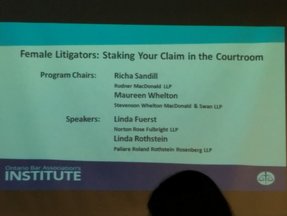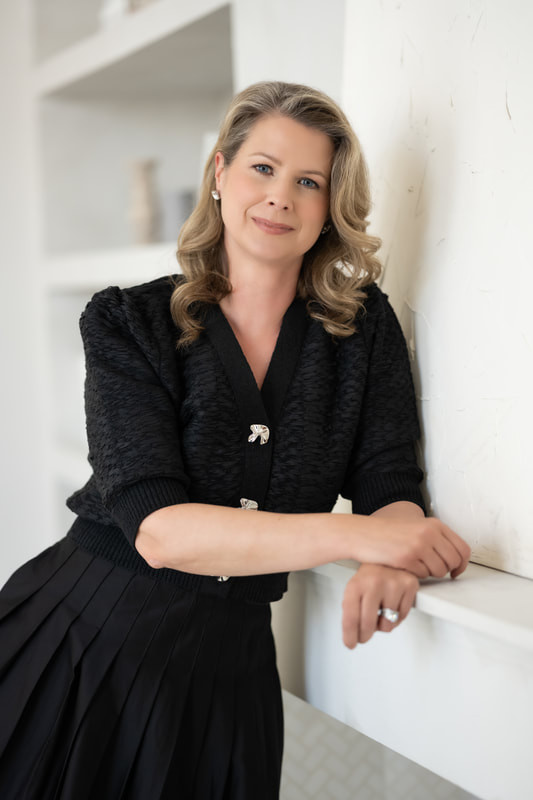 Another great program was presented by the Ontario Bar Association's Women Lawyers Forum, this time jointly with the Civil Litigation section. It was called “Female Litigators: Staking Your Claim in the Courtroom” and it was part of the 2017 OBA Institute. The two hour program was chaired by Maureen Whelton and Richa Sandill and was split into two sessions. The first, “Candid Conversations”, with Linda Rothstein and Linda Fuerst, was indeed candid. While some may be tired of hearing “back in my day the judge called me ‘toots’” talk, I believe that it is important to remind ourselves that not so long ago things were much worse for female litigators. Most lawyers in the room were shocked at the sexist behaviour exhibited by judges and lawyers toward “The Lindas” (as they were affectionately nicknamed) in their early days of practice. Linda Fuerst had to “dress like a woman” in court in order to gain respect from the judges. Comments on their appearance were often made. Linda Rothstein was once interrupted by a judge while she was making submissions in court so he could tell her how nice her nails looked. Both Lindas stuck to their guns, demanded respect, and knew they were worthy of the same respect as their male colleagues. Both also recognized that change occurred when there were more female judges appointed to the bench, but outside the courtroom the discrimination continued. Some takeaways:
The second session was called “Women in the Courtroom: Intergenerational Perspectives on Challenges and Success Strategies” and Shantona Chaudhury, Anne London-Weinstein, Asha James and Sandra Nishikawa were on the panel. I appreciated Sandra’s initial comment that those of us in the room were ultimately very privileged and empowered women. It was important to keep our privilege in mind as we went on to “whine and complain” as Sandra half-jokingly put it. I agree wholeheartedly. The stories from the second panel revealed that in some ways we have come a long way; but in others, not so much. For example, Sandra was recently at the Supreme Court of Canada when, before Court, she was referred to as “the girl” by a senior staff member. While the person later apologized, this is just wrong and disheartening on so many levels. Some of the panellists also spoke from the perspective of being racialized lawyers and how that has affected how they are treated in the courtroom and elsewhere. Sandra is sometimes mistakenly identified as a court translator. Asha finds that racialized lawyers must be extra or over prepared compared to other litigators. A few of the panellists expressed the same sentiment as The Lindas that behaviour outside the courtroom is always worse than in the courtroom as there is no “overseer”. When asked if we should call others out on bad behaviour, the panellists felt that it depended on the context. As women, yes, we should. However, as litigators we have our clients and the case to think about. Is it in your client’s best interest to call out opposing counsel or a judge or adjudicator on their misbehaviour? Perhaps you wait until the case is done. Shantona advised us to know how to “pick your battles”. Is it something egregious? Call them out. Or is it something that can wait? Then, let it wait. As you practice longer, and gain more experience, it is easier to make these calls. If something occurs during a court appearance, Asha suggested calling a mentor for advice when court was on a break. Some takeaways from the second session:
0 Comments
Your comment will be posted after it is approved.
Leave a Reply. |
Erin C. Cowling is a former freelance lawyer, entrepreneur, business and career consultant, speaker, writer and CEO and Founder of Flex Legal Network Inc., a network of freelance lawyers.
Categories
All
Archives
December 2022
|
|
(C) 2014-2024 Cowling Legal. All rights reserved.
|
Please note I am not currently practicing law.
Information on this website does not constitute legal advice and is for informational purposes only. Accessing or using this website does not create a solicitor-client relationship. See website Terms of Use/Privacy Policy. info@cowlinglegal.com
3080 Yonge Street, Suite 6060 Toronto,ON M4N 3N1 (appointment only) |






 RSS Feed
RSS Feed
